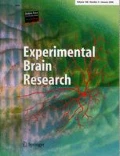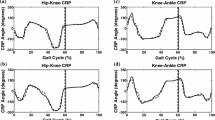Abstract
The purpose of this study was to determine how two different types of concurrent tasks affect gait stability in patients with concussion and how balance is maintained. Fourteen individuals suffering from a grade II concussion and 14 matched controls performed a single task of level walking and two types of concurrent tasks during level walking: a discrete reaction time task and a continuous sequential question and answer task. Common gait spatial/temporal measurements, whole-body center of mass motion, and the center of pressure trajectory were recorded. Concussed individuals demonstrated differences in gait while performing single-task level walking and while being challenged with a more difficult secondary task compared to normal controls. Concussed individuals adopted a slower, more conservative gait strategy to maintain stability, but still exhibited signs of instability with center of mass deviations in the coronal plane increasing by 13% during the question and answer dual-task and 26% more than control subjects. Trends of attentional deficits were present with the question and answer task, while the reaction time task seemed to help concussed individuals be more alert to their gait and stability. Recommendations for a sensitive testing protocol of deficits following concussion are explained.

Similar content being viewed by others
References
American Academy of Neurology (1997) Practice parameter: the management of concussion in sports [summary statement]. Neurology 48:581–585
Bardy BG, Laurent M (1991) Visual cues and attention demand in locomotor positioning. Percept Mot Skills 72:915–926
Bell R, Hall RC (1977) The mental status examination. Am Fam Physician 16:145–152
Bernstein DM (1999) Recovery from mild head injury. Brain Inj 13:151–172
Bernstein DM (2002) Information processing difficulty long after self-reported concussion. J Int Neuropsychol Soc 8:673–682
Bowen A, Wenman R, Mickelborough J, Foster J, Hill E, Tallis R (2001) Dual-task effects of talking while walking on velocity and balance following a stroke. Age ageing 30:319–323
Brown LA, Shumway-Cook A, Woollacott MH (1999) Attentional demands and postural recovery: the effects of aging. J Gerontol 54A:M165–M171
Brukner P, Kahn K (2001) Clinical sports medicine. McGraw-Hill, Sydney
CDC (1997) Sports-related recurrent brain injuries—United States. MMWR 46:224–227
Chou L-S, Kaufman KR, Hahn ME, Brey RH (2003) Medio-lateral motion of the center of mass during obstacle crossing distinguishes elderly individuals with imbalance. Gait Posture 18:125–133
Chou L-S, Kaufman KR, Walker-Rabatin AE, Brey RH, Basford JR (2004) Dynamic instability during obstacle crossing following traumatic brain injury. Gait Posture 20:245–254
Cock J, Fordham C, Cockburn J, Haggard P (2003) Who knows best? Awareness of divided attention difficulty in a neurological rehabilitation setting. Brain Inj 17:561–574
Collins MW, Lovell MR, McKeag DB (1999) Current issues in managing sports-related concussion. J Am Med Assoc 282:2283–2285
de Jong R (1995) Perception-action coupling and S-R compatibility. Acta Psychologica 90:287–299
Ebersbach G, Dimitrijevic MR, Poewe W (1995) Influence of concurrent tasks on gait: a dual-task approach. Percept Mot Skills 81:107–113
Gagnon I, Swaine B, Friedman D, Forget R (2004) Children show decreased dynamic balance after mild traumatic brain injury. Arch Phys Med Rehabil 85:444–452
Godefroy O, Lhullier-Lamy C, Rousseaux M (2002) SRT lengthening: role of an alertness deficit in frontal damaged patients. Neuropsychologia 40:2234–2241
Guskiewicz KM, Weaver NL, Padua DA, Garrett WE Jr (2000) Epidemiology of concussion in collegiate and high school football players. Am J Sports Med 28:643–650
Haaland KY, Temkin N, Randahl G, Dikmen S (1994) Recovery of simple motor skills after head injury. J Clin Exp Neuropsychol 16:448–456
Haggard P, Cockburn J, Cock J, Fordham C, Wade D (2000) Interference between gait and cognitive tasks in a rehabilitating neurological population. J Neurol Neurosurg Psychiatry 69:479–486
Hahn ME, Chou L-S (2004) Age-related reduction in sagittal plane center of mass motion during obstacle crossing. J Biomech 37:837–844
Halterman CI, Langan J, Drew A, Rodriguez E, Osternig LR, Chou LS, van Donkelaar P (2006) Tracking the recovery of visuospatial attention deficits in mild traumatic brain injury. Brain 129(Pt) 3:747–753
Kahneman D (1973) Attention and Effort. Prentice-Hall, Englewood Cliffs
Kaya BK, Krebs DE, Riley PO (1998) Dynamic stability in elders: momentum control in locomotor ADL. J Gerontol A Biol Sci Med Sci 53:M126–134
Krauss JK, Tränkle R, Kopp KH (1997) Posttraumatic movement disorders after moderate or mild head injury. Mov Disord 12:428–431
Lajoie Y, Teasdale N, Bard C, Fleury M (1993) Attentional demands for static and dynamic equilibrium. Exp Brain Res 97:139–144
Maki BE (1997) Gait changes in older adults: predictors of falls or indicators of fear. J Am Geriatr Soc 45:313–320
McCrea M, Guskiewicz KM, Marshall SW, Barr W, Randolph C, Cantu RC, Onate JA, Yang J, Kelly JP (2003) Acute effects and recovery time following concussion in collegiate football players: the NCAA concussion study. JAMA 290:2556–2563
McFadyen BJ, Swaine B, Dumas D, Durand A (2003) Residual effects of a traumatic brain injury on locomotor capacity: a first study of spatiotemporal patterns during unobstructed and obstructed walking. J Head Trauma Rehabil 18:512–525
Mrazik M, Ferrara MS, Peterson CL, Elliott RE, Courson RW, Clanton MD, Hynd GW (2000) Injury severity and neuropsychological and balance outcomes of four college athletes. Brain Inj 14:921–931
Parker TM, Osternig LR, Lee H-J, van Donkelaar P, Chou L-S (2005) The effect of divided attention on gait stability following concussion. Clin Biomech 20:389–395
Pashler H (1990) Do response modality effects support multiprocessor models of divided attention? J Exp Psychol 16:826–842
Slobounov S, Sebastianelli W, Simon R (2002) Neurophysiological and behavioral concomitants of mild brain injury in collegiate athletes. Clin Neurophysiol 113:185–193
Thurman D, Alverson C, Dunn K, Guerrero J, Sniezek J (1999) Traumatic brain injury in the United States: a public health perspective. J Head Trauma Rehabil 14:602–615
Vallis LA, Patla AE (2004) Expected and unexpected head yaw movements result in different modification of gait and whole body coordination strategies. Exp Brain Res 157:94–110
van Donkelaar P, Langan J, Rodriguez E, Drew A, Halterman C, Osternig LR, Chou L-S (2005) Attentional deficits in concussion. Brain Injury (in press)
van Donkelaar P, Osternig LR, Chou L-S (2006) Attentional and biomechanical deficits interact after mild traumatic brain injury. Exercise and Sport Science Review 34 (in press)
Weerdesteyn V, Schillings AM, van Galen GP, Duysens J (2003) Distraction affects the performance of obstacle avoidance during walking. J Mot Behav 35:53–63
Winter DA (1990) Biomechanics and Motor Control of Human Movement. Wiley-Interscience, New York
Woltring HJ (1986) A FORTRAN package for generalized, cross-validatory spline smoothing and differentiation. Advances in Engineering Software 8:104–113
Acknowledgments
This study was supported by the Center for Disease Control and Prevention (R49/CCR021735 and CCR023203). The authors gratefully acknowledge the assistance of Louis R. Osternig, Tonya M. Parker and Sarah R. Everman.
Author information
Authors and Affiliations
Corresponding author
Rights and permissions
About this article
Cite this article
Catena, R.D., van Donkelaar, P. & Chou, LS. Cognitive task effects on gait stability following concussion. Exp Brain Res 176, 23–31 (2007). https://doi.org/10.1007/s00221-006-0596-2
Received:
Accepted:
Published:
Issue Date:
DOI: https://doi.org/10.1007/s00221-006-0596-2




